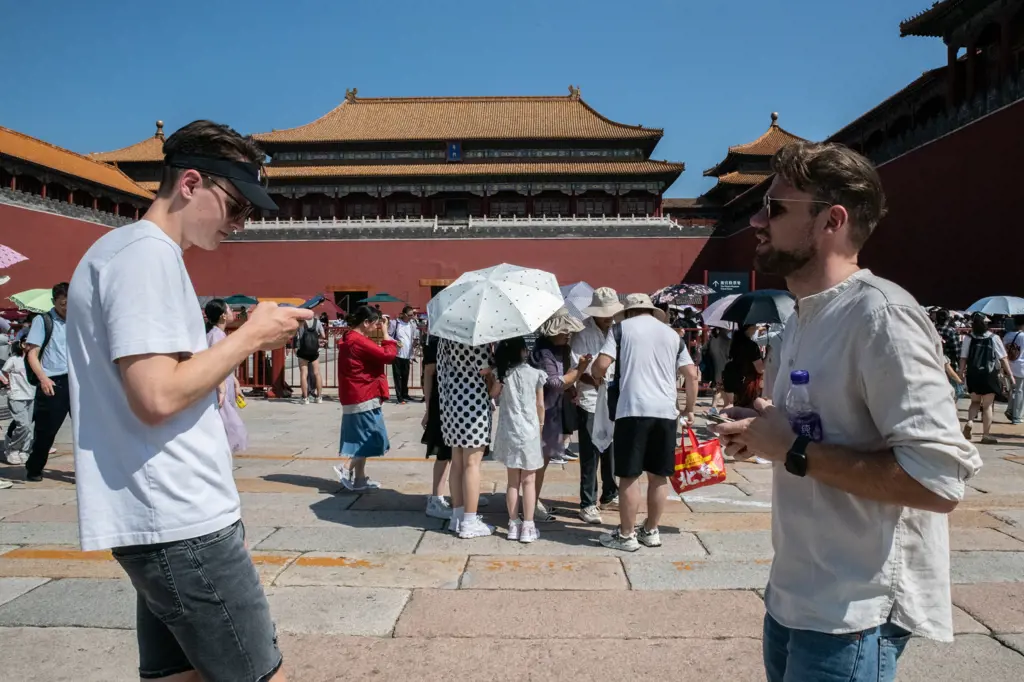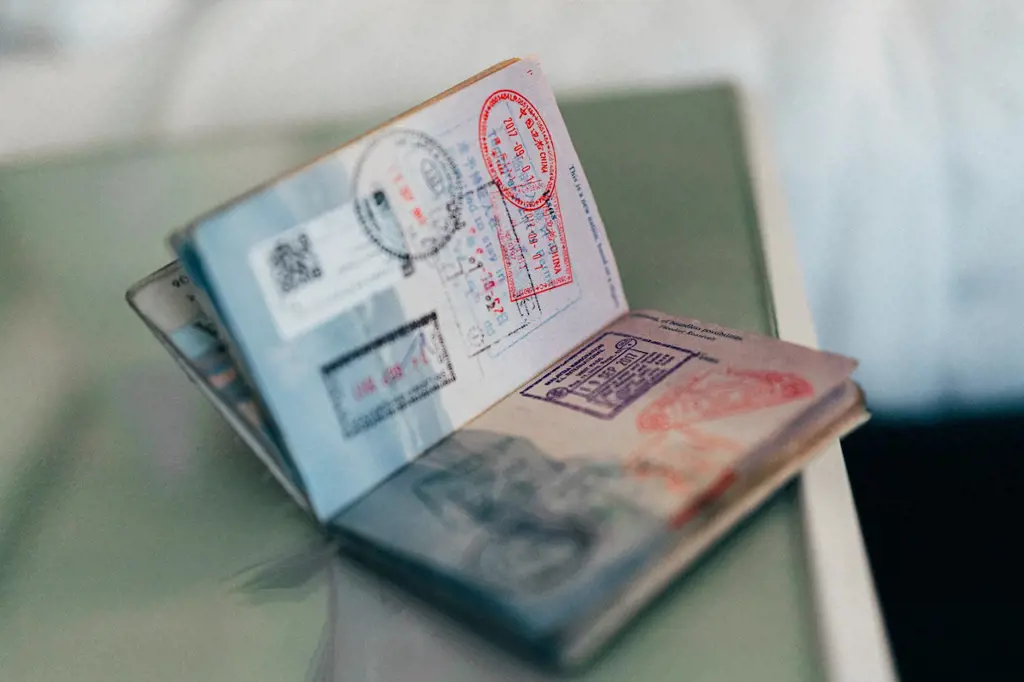
China is a country rich in history, culture, and natural wonders, drawing millions of tourists from around the world every year. But, before you start dreaming of exploring the Great Wall or marveling at the Forbidden City, it's essential to understand if it's possible to travel to China on a tourist visa. While planning a trip to China might seem daunting, understanding the visa requirements and processes can help make your travel dreams a reality. So, let's delve into the world of Chinese tourist visas and discover how you can turn your wanderlust into an unforgettable adventure in the Middle Kingdom.
What You'll Learn
- What are the requirements for obtaining a tourist visa to travel to China?
- How long is a tourist visa valid for in China?
- Can you extend a tourist visa while in China?
- Are there any restrictions or limitations on activities while on a tourist visa in China?
- What are the consequences of overstaying a tourist visa in China?

What are the requirements for obtaining a tourist visa to travel to China?
To travel to China as a tourist, you will need to obtain a tourist visa, also known as an L visa. This visa allows you to stay in China for a specified period of time for tourism purposes. The process of obtaining a tourist visa to China may seem daunting, but with the right information and preparation, it can be a straightforward and smooth process.
The requirements for obtaining a tourist visa to travel to China are as follows:
- Passport: Your passport must be valid for at least six months beyond your intended stay in China. It should also have at least two blank visa pages for the visa sticker.
- China Visa Application Form: You will need to fill out the China Visa Application Form accurately and completely. This form can be downloaded from the website of the Chinese embassy or consulate in your country.
- Photo: You will need to provide a recent passport-sized photo with a white background. The photo should meet the specific requirements set by the Chinese embassy or consulate.
- Travel Itinerary: You will need to submit a copy of your travel itinerary, which should include your flight tickets, hotel reservations, and a detailed plan of your activities in China.
- Proof of Financial Means: You will need to provide proof of your financial means to support your trip to China. This can be in the form of bank statements, credit card statements, or proof of employment and income.
- Invitation Letter: If you are visiting China as a tourist, you may need to provide an invitation letter from a Chinese tour operator or an invitation letter from your host in China. This letter should provide details about your planned activities in China and your relationship with the inviting party.
- Travel Insurance: It is highly recommended to have travel insurance that covers medical expenses, trip cancellations, and other unexpected events during your stay in China. While this is not a mandatory requirement, it can provide you with peace of mind and protect you financially.
- Vaccinations: Depending on your country of origin and the areas you plan to visit in China, you may need to provide proof of certain vaccinations, such as yellow fever or polio vaccinations. It is important to check the specific requirements with the Chinese embassy or consulate in your country.
Once you have gathered all the required documents, you will need to submit your visa application to the Chinese embassy or consulate in your country. It is advisable to apply for a tourist visa well in advance of your travel dates, as the processing time can vary. You may also be required to appear in person for an interview or provide additional documents, depending on the requirements of the Chinese embassy or consulate.
In conclusion, obtaining a tourist visa to travel to China requires careful preparation and attention to detail. By following the requirements outlined above and providing all the necessary documents, you can increase your chances of obtaining a tourist visa and enjoy a hassle-free trip to China. Remember to check the specific requirements and procedures of the Chinese embassy or consulate in your country, as they may vary slightly.
Can Dependent Travel on a Previous Employer's H4 Visa?
You may want to see also

How long is a tourist visa valid for in China?

A tourist visa is a document that allows individuals to enter a foreign country for leisure or recreational activities. In China, the validity period of a tourist visa depends on the type of visa and the duration of the stay requested by the applicant. There are several types of tourist visas available for different lengths of stay, including the L visa, F visa, and X visa.
The L visa is the most common tourist visa in China and is valid for a period of 30 to 90 days. This type of visa is suitable for short-term visits for sightseeing, visiting family or friends, or attending conferences or exhibitions. The exact duration of stay granted with an L visa depends on the discretion of the Chinese consulate or embassy where the visa is issued.
For travelers planning to stay in China for a longer period of time, there are other options available. The F visa is a business visa that can also be used for tourism purposes. This visa is typically valid for up to 6 months and allows for multiple entries into China within that time frame. It is important to note that the F visa requires an invitation letter from a Chinese company or organization.
Another visa option for long-term tourism in China is the X visa, also known as the student visa. This visa is suitable for individuals planning to study or participate in an educational program in China. The X visa is generally valid for the duration of the program, which can range from a few months to several years.
It is important to note that the validity period of a tourist visa is not the same as the allowed duration of stay. The validity period refers to the length of time in which the visa can be used to enter China, while the duration of stay refers to the amount of time an individual is allowed to stay in the country once they have entered. The duration of stay for a tourist visa is typically 30, 60, or 90 days, but this can vary depending on the visa type and the individual's circumstances.
To apply for a tourist visa to China, individuals must submit their application to the Chinese consulate or embassy in their home country. The application process usually requires completing a visa application form, providing a valid passport, and submitting any supporting documents required for the specific visa type. It is recommended to apply for a tourist visa well in advance of the planned travel date to allow for processing time.
In conclusion, the validity period of a tourist visa in China depends on the type of visa and the duration of stay requested by the applicant. The most common tourist visa, the L visa, is valid for 30 to 90 days, while the F and X visas allow for longer stays. It is important to carefully review the requirements and restrictions of the specific visa type before applying and planning a trip to China.
Traveling with a Visa U: What You Need to Know
You may want to see also

Can you extend a tourist visa while in China?

When planning a trip to China, it's important to understand the visa requirements and limitations. Tourists visiting China are typically granted a visa known as the L visa, which allows them to stay in the country for a certain period of time. However, there are situations where you may need to extend your tourist visa while in China. This article will explore whether it is possible to extend a tourist visa in China and the steps involved in doing so.
In China, the rules and regulations surrounding visa extensions can be complex and vary depending on your specific situation. It's crucial to familiarize yourself with the latest regulations and seek advice from the appropriate authorities, such as the local Public Security Bureau, for the most accurate and up-to-date information.
Generally speaking, it is possible to extend your tourist visa while in China, but certain conditions must be met. The first thing to consider is the type of visa you are holding. Only certain visa categories are eligible for extension, and it's important to check whether the L visa allows for extension in your specific case.
If your visa is eligible for extension, you can begin the process by collecting the necessary documents. These documents typically include a completed visa extension application form, your passport, a recent passport-sized photograph, your valid visa, and any supporting documents that may be required, such as proof of travel plans or financial stability.
Once you have gathered the required documents, you will need to submit them to the appropriate authorities. This is typically done at the local Public Security Bureau or Exit and Entry Administration. It's important to note that the specific procedure may vary slightly depending on your location, so it's advisable to inquire about the exact process at your nearest relevant office.
During the application process, it's important to be prepared for a potential interview or questioning about your need for a visa extension. Authorities may want to verify the reasons behind your request and ensure that you meet the requirements for an extension. It's always helpful to be truthful and provide any necessary documentation to support your case.
If your visa extension request is approved, you will receive a new visa that indicates the extended validity period. It's important to keep in mind that visa extensions are not guaranteed, and it's advisable to apply well in advance of your current visa's expiration date to allow for processing time.
It's worth noting that visa extensions are typically granted on a case-by-case basis. Factors such as the purpose of your stay, the validity of your current visa, and your overall compliance with the rules and regulations may all influence the decision. It's always a good idea to seek professional advice from a visa agency or immigration lawyer to ensure that you meet all the requirements and increase your chances of a successful visa extension.
In conclusion, it is possible to extend a tourist visa while in China, but it is a process that requires careful preparation and adherence to the relevant rules and regulations. It's essential to check the eligibility of your visa category, gather the necessary documents, and submit them to the appropriate authorities. Being honest, providing supporting documentation, and seeking professional advice can all improve your chances of obtaining a visa extension in China.
Exploring the Stunning Beauty of Croatia: Traveling with a Schengen Visa
You may want to see also

Are there any restrictions or limitations on activities while on a tourist visa in China?
As a vibrant and diverse country, China attracts millions of tourists each year. Whether visitors are captivated by its rich history, stunning landscapes, or world-famous cuisine, the country has plenty to offer. However, it is important for tourists to be aware of the restrictions and limitations on activities while on a tourist visa in China.
One of the first things to note is that a tourist visa, also known as an L visa, is specifically designed for sightseeing, visiting family or friends, or engaging in other non-business activities. This means that while on a tourist visa, engaging in any form of employment is strictly prohibited. It is crucial to respect this limitation as violating Chinese immigration laws can result in severe consequences, including deportation and a ban from reentering the country.
Furthermore, tourists on a visa should also be mindful of engaging in any political or sensitive activities while in China. The Chinese government tightly controls information and restricts freedom of speech, so it is important to avoid any discussions or activities that may be considered controversial or politically sensitive. Posting politically sensitive content on social media platforms or engaging in protests or demonstrations can lead to serious legal consequences.
In addition to these limitations, tourists should also be aware of certain cultural norms and customs in China. While visiting religious sites, such as temples or churches, it is important to dress modestly and respectfully. Additionally, it is common courtesy to ask for permission before taking photos of individuals, especially in more rural or traditional areas.
Another important consideration is the use of VPNs (Virtual Private Networks) in China. The Chinese government has imposed restrictions on accessing certain websites and social media platforms, such as Facebook and Instagram. While using VPNs is not illegal, the Chinese government has been cracking down on their usage in recent years. Tourists should exercise caution when using VPNs, as their usage can potentially land them in legal trouble.
To illustrate the potential consequences of these restrictions and limitations, consider the case of a tourist who unknowingly violates the employment restrictions on their tourist visa. If caught working illegally, they may face fines, detention, deportation, and a ban from reentering the country. Similarly, a visitor who engages in politically sensitive activities may face detention, interrogation, and other legal consequences.
To avoid any complications, it is essential for tourists to familiarize themselves with the rules and regulations that govern their stay in China. They should thoroughly research the specific requirements of a tourist visa and ensure that they comply with all restrictions and limitations. Additionally, consulting with a knowledgeable travel agent or contacting the Chinese embassy or consulate can provide valuable guidance and clarify any uncertainties.
In summary, while China offers a multitude of attractions and experiences for tourists, it is important to be aware of the restrictions and limitations that come with a tourist visa. These include avoiding employment, refraining from engaging in politically sensitive activities, being mindful of cultural customs, and exercising caution when using VPNs. By respecting these limitations, tourists can ensure a smooth and enjoyable visit to China.
Exploring Switzerland: Can I travel with a Schengen Visa?
You may want to see also

What are the consequences of overstaying a tourist visa in China?

If you are planning to visit China as a tourist, it is crucial to be aware of the visa regulations and the consequences of overstaying your tourist visa. Overstaying a tourist visa in China can have serious consequences, both legally and practically. In this article, we will explore the potential consequences of overstaying a tourist visa in China.
Legally, overstaying a tourist visa in China is a violation of the country's immigration laws. The Chinese authorities take such violations seriously and have implemented strict measures to prevent and penalize overstays. The consequences can range from fines and temporary detention to deportation and entry bans.
The first consequence of overstaying a tourist visa is the imposition of fines. The amount of the fine varies depending on the length of the overstayed period. Generally, the longer you overstay, the higher the fine you will have to pay. These fines can be quite substantial and can quickly add up, especially if you overstay for an extended period of time.
In addition to fines, overstayers may also be subject to temporary detention. In some cases, Chinese immigration officials may detain individuals who have overstayed their visas until they can be deported. This can result in a considerable loss of personal freedom and can be a challenging experience for the individual involved.
Furthermore, overstaying a tourist visa can lead to deportation. Individuals who overstay their visas may be ordered to leave the country and can be forcibly removed if necessary. Deportation can create significant hardships, as individuals may be separated from their belongings, friends, and family in China.
Perhaps one of the most severe consequences of overstaying a tourist visa in China is the potential for being banned from re-entering the country. Chinese immigration authorities have the right to impose entry bans on individuals who have violated visa regulations. These bans can last for several years or even indefinitely, effectively preventing individuals from returning to China in the future.
Practically, overstaying a tourist visa can also have several negative consequences. For example, you may encounter difficulties in applying for future visas to other countries if you have a record of overstaying in China. Many countries exchange visa information, and having a history of immigration violations can make it harder to obtain a visa in the future.
Overstaying a tourist visa can also damage your reputation and credibility. If you are caught overstaying in China, your character and trustworthiness may be questioned by immigration officials in other countries. This can make it harder for you to travel, work, or study abroad in the future.
In conclusion, overstaying a tourist visa in China can have serious consequences both legally and practically. It can result in fines, temporary detention, deportation, and entry bans. Moreover, it can have long-term implications for your ability to travel and obtain visas in the future. Therefore, it is crucial to adhere to visa regulations and ensure that you leave China before your tourist visa expires.
Exploring the Possibilities: Can H1B Visa Holders Travel to Canada?
You may want to see also
Frequently asked questions
Yes, it is possible to travel to China on a tourist visa. A tourist visa, also known as an L visa, allows visitors to enter China for sightseeing, visiting friends or relatives, or other non-business purposes.
The duration of stay on a tourist visa varies depending on the type of visa and the country of origin. Generally, single-entry tourist visas allow for a stay of up to 30 days, while double-entry and multiple-entry tourist visas can allow for stays of up to 60 or 90 days respectively. It's important to note that the duration of stay is determined by the Chinese authorities upon arrival, and overstaying your visa can result in fines or other penalties.
To apply for a tourist visa to China, you will need to submit the required documents to the Chinese embassy or consulate in your country. The documents typically include a completed visa application form, a valid passport with at least six months' validity and empty pages, a recent passport-sized photo, proof of travel itinerary such as flight tickets or hotel reservations, and proof of financial means to cover your expenses during your stay in China. You may also need to provide additional documents specific to your situation, such as an invitation letter from a Chinese host or proof of relationship if visiting friends or relatives. It's recommended to apply for the visa well in advance of your planned travel dates, as processing times can vary.







